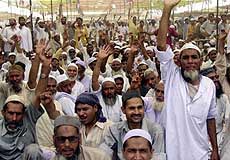Iran Produces High Enriched Uranium
|
IslamOnline.net & News Agencies |
|
"When we say that we don't build nuclear bombs, it means that we won't do that because we don't believe in having it," Ahmadinejad said. (Reuters) |
"By God's grace ... it was reported that the first consignment of 20 percent enriched uranium was produced and was put at the disposal of the scientists," President Mahmoud Ahmadinejad told hundreds of thousands of cheering, flag-waving Iranians in Tehran's Azadi (Freedom) Square.
"In the near future we will treble its production."
The Iranian leader had ordered the atomic authority on Sunday, February 6, to start producing higher-grade nuclear reactor fuel.
Iran had previously purified the fuel to just 3.5 percent, the level required for a nuclear power plant.
Tehran says it moved to produce the 20 percent enriched uranium for a research reactor making medical isotopes out of frustration at failure to reach agreement on a uranium exchange with world powers.
"They think it is such a big job to take some hundred kilos of 3.5 pct uranium out of Iran," Ahmadinejad said in the most important day in Iran's political calendar.
"We are making several kilos of this in Natanz every day. In the near future, inshallah, our daily production will be tripled."
Iran and the West are at loggerheads over a UN-sponsored deal under which Tehran would send about 70 percent of its low-enriched uranium to Russia and France in exchange for more highly enriched fuel to produce medical isotopes.
The West demands Iran to accept the deal, while Tehran insists that the low-enriched uranium swap should happen on stages.
No Bomb
Experts say that once Iran has enriched uranium to the 20 percent level, there is nothing to stop it carrying on to the 93 percent level needed to produce nuclear weapons as the technology is the same.
But Ahmadinejad insisted his country has no such plans.
"The Iranian nation is brave enough that if one day we wanted to build nuclear bombs we would announce it publicly without being afraid of you," he said, addressing Iran's Western rivals.
"When we say that we don't build nuclear bombs, it means that we won't do that because we don't believe in having it."
Ahmadinejad stressed that Iran now had nothing to hide and would not be bullied.
"They want to dominate our region but the Iranian people will never let them do that."
The West accuses Tehran of developing a secret nuclear weapons program.
Iran insists that its nuclear program only aims at procuring power to feed an increasing local consumption.
Ahmadinejad accused US President Barack Obama of squandering an opportunity to change Washington's foreign policy.
"Unfortunately, the hope for change is in the process of rapidly changing to despair."
Washington is rallying allies to push through a new round of tighter sanctions on Iran.
Though Russia seems to be on board, China remains reluctant and urges increased efforts to resolve the standoff through negotiations.
CAIRO –
"I never had any intention of carrying out any kind of terrorist activity," Mohammed Atif Siddique told the Daily Record on Wednesday, February 10.
"I admit to being a stupid loudmouth but I never planned to hurt, let alone kill anyone anywhere."
Siddique, a student from Alva, Clackmannanshire, was arrested in April 2006 as he waited to board a flight to Pakistan with his uncle.
In 2007, he was sentenced to 8 year in jail under the controversial Terrorism Act 2000 on charges of being a "wannabe suicide bomber" because he had messages from Al-Qaeda and praise for "martyrs" in Iraq on his laptop.
"At the time, I was interested in what was happening in the Middle East, and I accessed a lot of information from the internet," Siddique told the Scottish daily.
"The stuff I had in my possession was freely and easily available."
The Muslim student refuted allegation he was Al-Qaeda sympathizer or wanted to be a suicide bomber.
"If I was al-Qaeda, how come I stayed at home for seven days after the police arrested me? I used to go to the police station to ask for my laptop back," he said.
"It was said in court that I was a 'wannabe suicide bomber'. That shocked me to the core. I could not understand why I had been prosecuted."
The Appeal Court in Edinburgh quashed Siddique conviction on Tuesday, February 9, saying the Muslim student had suffered a "miscarriage of justice".
Destroyed Life
As supporters waited outside court, Siddique stepped out with his lawyer Aamer Anwar.
"Our law should bring to account those who plan acts of terror and not criminalize young Muslims for thought crime and the possession of propaganda," he said.
"I have always maintained my innocence, but they took my liberty, destroyed my family’s reputation and labeled me a terrorist, but I never had any bombs or plans to hurt anyone."
The family also had its share of suffering because of the case.
"At the time, I was horrified and couldn't sleep," said his mother Parveen.
"I could not believe it had happened."
His brother Asif, 29, had to quit his law studies after he and his uncles were questioned for five days over the case.
But the family found solace from the people of Alva.
"They came into the shop and sent messages of support and sent cards," Asif recalled.
Though wasting about four years of his youthful live in jail, Siddique holds no drudge against society.
"I hope I can now pick up the threads of my life, assume some kind of normality, take up my place in society and contribute positively to the community."





